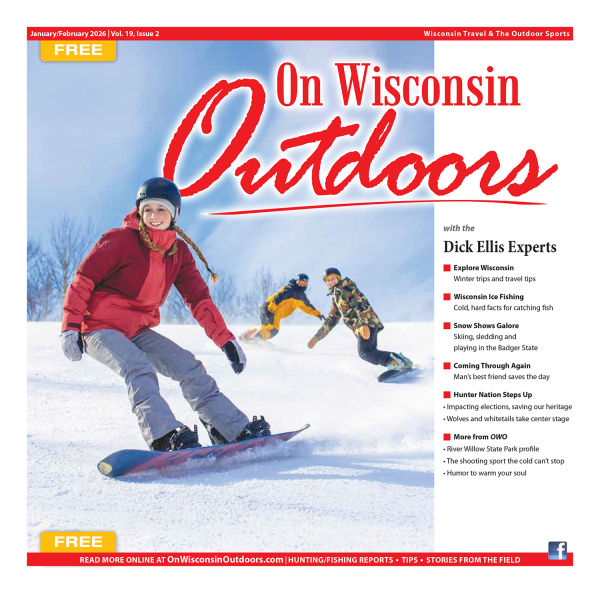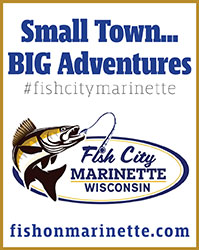DNR proposes emergency rule to provide three bag limit for walleye in most Ceded Territory waters
Emergency rule to be considered at April Natural Resources Board meeting
MADISON, Wis. –The Wisconsin Department of Natural Resources will seek to maintain a three walleye daily bag limit on most lakes and rivers in the Wisconsin Ceded Territory through a proposed emergency rule that will be considered by the Wisconsin Natural Resources Board at its April 8 meeting.
The department developed the proposed rule as a tool to manage the walleye fishery after listening to citizens and stakeholders eager for more predictable and uniform angling opportunities on lakes in the region. The proposed rule uses more restrictive size regulations in concert with a season-long, three walleye daily bag limit on northern waters.
The rule proposes to replace the current system of annually adjusting bag limits with equally protective minimum length and slot limits in conjunction with a three walleye daily bag limit that will apply across the Ceded Territory to manage angler harvest of adult walleye at levels that can be supported over time.
As part of a 1983 federal court decision affirming Chippewa off-reservation hunting, fishing and gathering rights, the six bands of Wisconsin Chippewa set annual tribal harvest quotas for off-reservation lakes in the Wisconsin Ceded Territory. In past years, DNR has adjusted walleye daily bag limits for recreational hook and line anglers in lakes declared for harvest by the Chippewa bands to assure the combined tribal and recreational angler harvest in a lake does not jeopardize the stability of the lake’s walleye population.
Consideration of the proposed rule by the board follows 2015 tribal declarations similar to those made in 2014, with 235 of 537 lakes being declared for harvest at a rate that in past years would have resulted in a one walleye daily bag limit to start the season. In past years, bag limits on some lakes have been revised upwards later in the season to reflect actual tribal harvest and the reduced take by recreational anglers during the weeks immediately following the season opener when the reduced limits were still in place.
“We are pleased to propose an effective solution based on sound science and long-term management practices that provides more consistency for anglers while protecting walleye populations throughout the Ceded Territory,” said DNR Secretary Cathy Stepp. "Wisconsin's strong walleye fishery and the tourism it produces are important to northern Wisconsin and our state as a whole. We are grateful for the continuing involvement of all of our partners as we work together to find innovative solutions.”
The request for the emergency rule follows board approval of a scope statement on the concept at the board’s January meeting. If approved, DNR will continue to seek comments through the public hearing and citizen input process. This feedback will be critical in developing a permanent rule to provide further stability for lakes throughout the region.
The proposed rule also includes language related to a collaborative plan brought forward by area angling groups, community leaders and Chippewa tribal fisheries managers to DNR staff that attempts to restore successful natural reproduction and a sustainable walleye population on the Minocqua and Tomahawk chain of lakes in Oneida County.
The proposal calls for establishment of a five year catch-and-release only walleye fishery on the chain while additional habitat improvements, stocking efforts and research projects move ahead. As part of its commitment to the effort, the Lac du Flambeau Band of Lake Superior Chippewa has agreed to restrict its harvest during the rehabilitation period.
The walleye project has been discussed at several community meetings in recent months and if approved by the Natural Resources Board, the rules also would be subject to a public hearing and comment process. The recreational angling season for other popular species of fish on the chain will not be affected.
Joe Hennessy, DNR fisheries staff specialist, said that the Minocqua-Tomahawk proposal is an extension of a project initiated by DNR in 2011 with the purpose of walleye population restoration. Efforts to reverse the decline documented in recent years have included restricting the recreational angling harvest in the lakes and rebuilding the walleye population through stocking fall fingerling walleye.
“In this case,” Hennessy said, “the concept put forward by user groups for these lakes was to be more aggressive in our restoration effort. It became clear that both anglers and tribal spearers were interested in a more aggressive restoration approach that included a period of ‘no harvest’ of walleye, so we included that within the proposed emergency rule.”
Gregg Walker, Minocqua representative for the Headwaters Basin Chapter of Walleyes forTomorrow, credited the dedication of Chippewa tribal leaders, local business owners and angling enthusiasts to a process that required months of study and a willingness to put aside individual interests in support of the shared resource.
“By working together, we hope to rebuild the fishery for our children and grandchildren,” Walker said. “In the meantime, we look forward to working with local volunteers, visitors and others who would like to help us as we move forward to prioritize and implement habitat improvement and joint stocking efforts.”
For background information on the joint tribal and recreational fishery in the Wisconsin Ceded Territory, Chippewa treaty rights, a description of the management system used to ensure the long term viability of fisheries in the Ceded Territory and to see data collected as part of that management system, including walleye population estimates and creel survey summaries for all game fish, visit dnr.wi.gov and search "Ceded Territory." Find a copy of the proposal on the Wisconsin Natural Resources Board page in pdf format.











